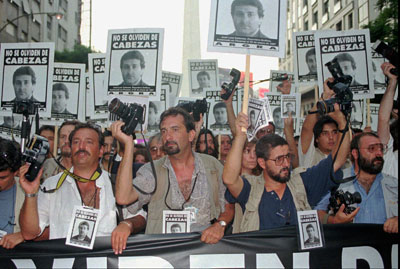It was a cold winter morning more than 15 years ago. As part of my daily routine as a foreign correspondent, I opened my laptop to read the Argentine papers. I was shocked by a headline: my colleague José Luis Cabezas, a photographer for the newsweekly magazine Noticias, had been murdered. His bullet-ridden body was found on January 25, 1997, inside a burned car, handcuffed and charred, on the outskirts of the beach resort of Pinamar.
The murder of Cabezas, the most brutal assassination of a journalist since the restoration of democracy in 1983, stunned Argentine society. Local journalists, free press activists, and other citizens took to the streets to urge the government of President Carlos Saúl Menem to thoroughly investigate the crime. Cabezas was the first media professional to take a photograph of Alfredo Yabrán, a reclusive and powerful businessman described as the head of the local mafia. Yabrán had built up a fortune through lucrative government contracts and by controlling half of the country’s private mail delivery and a large portion of government printing. Yabrán was not known to the public until Noticias published articles about his businesses and ties to politicians and the government. Cabezas’ photographs had illustrated stories about corruption of the business and political elite, who traditionally migrate to Pinamar in the summer.
As the New York-based bureau chief for the magazine, I was given the task of contacting press freedom activists in the U.S. who would sustain pressure on the Argentine government to fully investigate the crime. On January 27, CPJ sent a letter to Menem urging his government to conduct a thorough investigation into the murder and calling for a swift prosecution of those responsible. I also interviewed Katharine Graham, owner of the Washington Post Company and a CPJ board member, who expressed her solidarity with Noticias, Cabezas’ family, and the Argentine press corps. In May, CPJ published a special report on the photographer’s slaying.
The murder occurred in the middle of a political battle between Menem and Buenos Aires Governor Eduardo Duhalde, as both Peronist leaders were embarking on campaigns to be the party’s presidential candidate in the 1999 election. (Pinamar is in the province of Buenos Aires). The administration had ties with Yabrán, and while Menem initially denied knowing the businessman personally, investigators soon found that the mogul had made several phone calls to Justice Minister Elias Jassan immediately after Cabezas was murdered. That discovery, exposed by the press (along with the fact Menem had traveled in Yabrán’s private plane), led to the minister’s resignation.
As a result of both international public opinion and concerted pressure by the Argentine press, in the year following the murder several people were arrested, including Yabrán’s chief of security and some former policemen. In May 1998, Yabrán was subpoenaed to testify in the murder trial. The elusive tycoon disappeared and was found dead days later in the province of Entre Ríos. He had shot himself in the mouth.
In early 2000, eight men were sentenced to life in prison for participating in the murder of Cabezas, and the court found that the crime had been masterminded by Yabrán. Another suspect received the same sentence in 2002. But all of the convicted killers have been freed in the past four years. After their sentences were reduced on appeal, they took advantage of legal provisions that allowed each year they served while their appeals were pending to be computed as two years. They served less than 10 years each. Last week, the local press group Foro de Periodismo Argentino (FOPEA) called on judicial authorities to send the convicted murderers back to prison–which could happen if the original sentence is upheld by an appeals court.
For Argentines, the murder of Cabezas was reminiscent of the thousands of killings that took place during the “dirty war” of the late 1970s and 1980s in the midst of the military dictatorship. It revived distressing memories in a country where dozens of journalists were killed during that period, and as many as 30,000 people disappeared after being kidnapped and tortured. In recent years, Argentina has made major strides in bringing members of the dictatorship to justice for crimes against humanity. The fact that all of Cabezas’ killers are free is a setback for the country’s fight against impunity.
